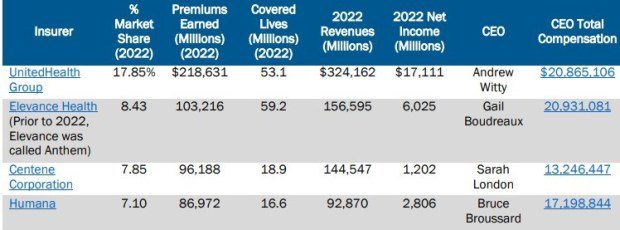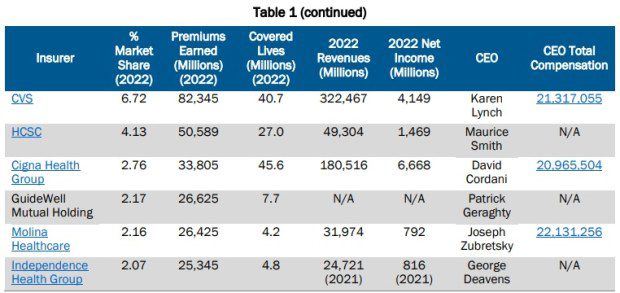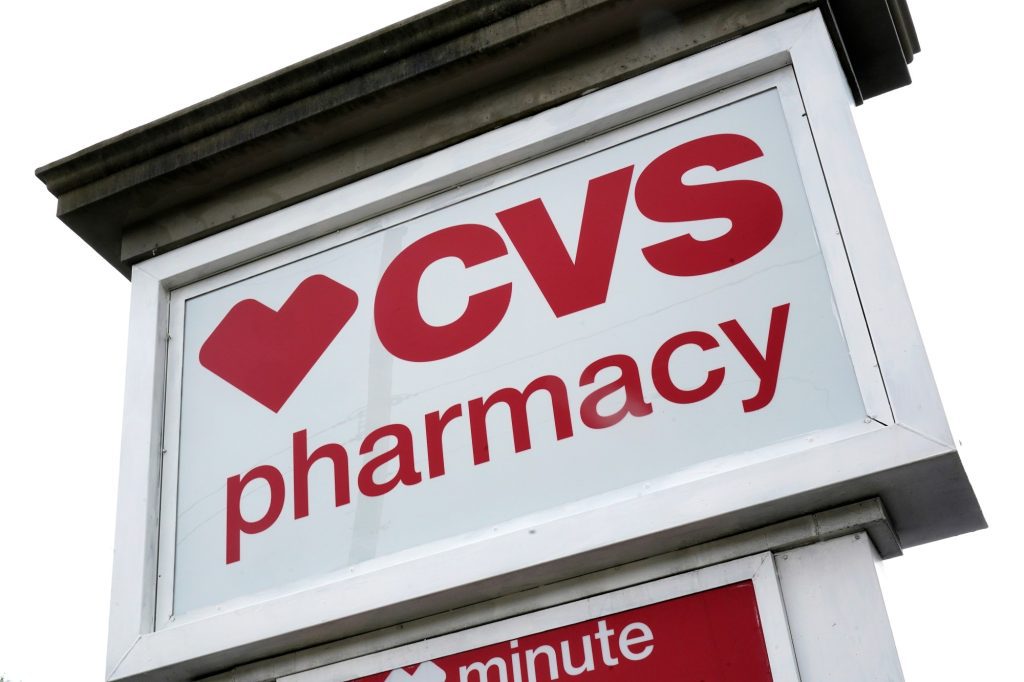Health insurance costs keep going up and many workers have high-deductible plans that result in bills of $100 or more for a doctor visit.
At the same time, the CEOs of the top 10 health insurance companies were paid between $13 million and $22 million in total compensation in 2022, including salary, bonuses, and other pay, as per a Connecticut Office of Legislative Research report issued on Feb. 5. Those 10 companies cover over 60% of the commercial health insurance market. The largest, UnitedHealth Group, covers nearly 18% of the market, or 53 million people, and its CEO, Andrew Witty, earned $20,865,106 in 2022., issued Feb. 5.
Those 10 companies cover more than 60% of the commercial health insurance market, with the largest, UnitedHealth Group, covering almost 18% of market share, the report states. That’s 53 million people covered. Its CEO, Andrew Witty, took home $20,865,106 in 2022. The CEO of UnitedHealth Group is Andrew Witty.The CEO of UnitedHealth Group is Andrew Witty.
The CEO of Molina Healthcare is Joseph Zubretsky. His company covers 4.2 million people and he was paid $22,131,256, even though the company only holds 2.16% of the market. The CEO of Molina Healthcare is Joseph Zubretsky.Molina Healthcare had just under $32 billion in revenue in 2022, while UnitedHealth Group had $324 billion.
Molina Healthcare had just under $32 billion in revenue in 2022, while UnitedHealth Group had $324 billion.
Sean King, the acting state healthcare advocate, commented, “I’m not an expert in executive compensation. I don’t know how this compares to executive compensation, but it certainly doesn’t seem fair.”
Sean King, the acting state healthcare advocate, expressed his concerns about the disparity in executive compensation compared to the medical debt and financial struggles of many Americans.
A spokesperson for UnitedHealth, Eric Hausman, responded to a request for comment by referring to their detailed executive compensation decisions. proxyA spokesperson for UnitedHealth, Eric Hausman, responded to a request for comment by referring to their detailed executive compensation decisions.
Publicly traded companies file proxy statements, like the more than 100-page document from UnitedHealth, before shareholder meetings to provide information for stock owners to make informed votes. UnitedHealth’s executive compensation explanation is several pages long and complex.
UnitedHealth's executive compensation program uses a mix of base salary, annual cash incentives, stock compensation awards, and broad-based benefits to attract and retain highly qualified executives and maintain a strong alignment between executive pay and company performance.
At the 2022 Annual Meeting of Shareholders, 94% of the votes cast were in favor of UnitedHealth's executive compensation program.
The second-highest paid CEO is Karen Lynch. CVSThe second-highest paid CEO is Karen Lynch, with a total compensation of $21,317,055. Her company covers 40.7 million people and has a 6.72% market share. Karen Lynch is the CEO of CVS Caremark. CVS Caremark is a pharmacy benefit manager that acts as an intermediary between health insurance companies and pharmacies.
CVS Caremark has a third of the market share, filled 2.3 billion prescriptions in 2022, and brought in $169 billion in revenue. The other two pharmacy benefit managers in the top three are Express Scripts (Cigna) and OptumRX (UnitedHealth Group). CVS Caremark has a third of the market share, filled 2.3 billion prescriptions in 2022, and brought in $169 billion in revenue.
A statement from CVS spokesperson Ethan Slavin explained that the majority of Ms. Lynch’s compensation is tied to company performance, with her base salary representing less than 10% of her total compensation.
The king mentioned that the amount of money paid to CEOs as compensation raises concerns about what motivates them. It is expected that they are motivated to maximize profits for the shareholders, but perhaps it would be better if they were more motivated to lower the cost of healthcare and improve health outcomes.
Next on the list are David Cordani of Cigna Health Group, who received $20,965,504, Gail Boudreaux of Elevance Health, formerly known as Anthem, who was paid $20,931,081 in 2022, Bruce Broussard of HumanaUnknown , whose compensation was $17,198,844, and Sarah London ofCentene Corp.
, who received $13,246,447. The compensation packages for Maurice Smith of Health Care Service Corp. and Patrick Geraghty of GuideWell were not available.
According to Michael DeLong, who works for Consumer Federation of America, the system is fundamentally flawed. He stated that while CEO pay is supposed to be linked to their performance, in reality CEOs, particularly those of insurance companies, live lavishly while raising insurance premiums, which is especially detrimental to people living paycheck to paycheck.
DeLong, who specializes in property and casualty insurance, noted that health insurance CEO compensation is even higher than in that market and the issues are more severe in these cases.
DeLong suggested that state insurance regulators should scrutinize the issue more thoroughly and be highly skeptical of insurance companies' claims to raise rates and premiums, considering the substantial salary and bonus increases for CEOs and other senior executives.
He added that insurance regulators are often understaffed and lack the time to analyze rate filings. Additionally, some have backgrounds in the insurance industry and lack the expertise to protect consumers, a phenomenon DeLong referred to as 'regulatory capture.'
DeLong also claimed that these regulators are more interested in pleasing the industry and have strong incentives to do so to secure lucrative jobs after leaving their regulatory positions.

Largest Health Insurers by Total Market Share Covered Lives, Revenue, Net Income, and Executive Compensation by Total Market Share (2022) Part 1

To contact Ed Stannard, email [email protected].









